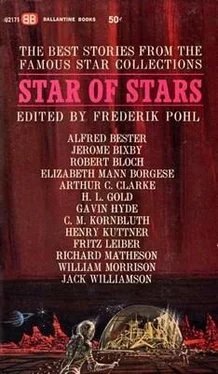Альфред Бестер - Disappearing Act
Здесь есть возможность читать онлайн «Альфред Бестер - Disappearing Act» весь текст электронной книги совершенно бесплатно (целиком полную версию без сокращений). В некоторых случаях можно слушать аудио, скачать через торрент в формате fb2 и присутствует краткое содержание. Год выпуска: 1960, Издательство: Ballantine Books, Жанр: Фантастика и фэнтези, на английском языке. Описание произведения, (предисловие) а так же отзывы посетителей доступны на портале библиотеки ЛибКат.
- Название:Disappearing Act
- Автор:
- Издательство:Ballantine Books
- Жанр:
- Год:1960
- ISBN:нет данных
- Рейтинг книги:5 / 5. Голосов: 1
-
Избранное:Добавить в избранное
- Отзывы:
-
Ваша оценка:
- 100
- 1
- 2
- 3
- 4
- 5
Disappearing Act: краткое содержание, описание и аннотация
Предлагаем к чтению аннотацию, описание, краткое содержание или предисловие (зависит от того, что написал сам автор книги «Disappearing Act»). Если вы не нашли необходимую информацию о книге — напишите в комментариях, мы постараемся отыскать её.
Disappearing Act — читать онлайн бесплатно полную книгу (весь текст) целиком
Ниже представлен текст книги, разбитый по страницам. Система сохранения места последней прочитанной страницы, позволяет с удобством читать онлайн бесплатно книгу «Disappearing Act», без необходимости каждый раз заново искать на чём Вы остановились. Поставьте закладку, и сможете в любой момент перейти на страницу, на которой закончили чтение.
Интервал:
Закладка:
ALFRED BESTER
Disappearing Act
This one wasn’t the last war or a war to end war. They called it the War for the American Dream. General Carpenter struck that note and sounded it constantly. There are fighting generals (vital to an army), political generals (vital to an administration), and public relations generals (vital to a war). General Carpenter was a master of public relations. Forthright and FourSquare, he had ideals as high and as understandable as the mottoes on money. In the mind of America he was the army, the administration, the nation’s shield and sword and stout right arm. His ideal was the American Dream.
“We are not fighting for money, for power, or for world domination,” General Carpenter announced at the Press Association dinner.
“We are fighting solely for the American Dream,” he said to the 137th Congress.
“Our aim is not aggression or the reduction of nations to slavery,” he said at the West Point Annual Officer’s Dinner.
“We are fighting for the meaning of civilization,” he told the San Francisco Pioneers’ Club.
“We are struggling for the ideal of civilization; for culture, for poetry, for the Only Things Worth Preserving,” he said at the Chicago Wheat Pit Festival.
“This is a war for survival,” he said. “We are not fighting for ourselves, but for our dreams; for the Better Things in Life which must not disappear from the face of the earth.”
America fought. General Carpenter asked for one hundred million men. The army was given one hundred million men. General Carpenter asked for ten thousand H-Bombs. Ten thousand H-Bombs were delivered and dropped. The enemy also dropped ten thousand H-Bombs and destroyed most of America’s cities.
“We must dig in against the hordes of barbarism,” General Carpenter said. “Give me a thousand engineers.”
One thousand engineers were forthcoming, and a hundred cities were dug and hollowed out beneath the rubble.
“Give me five hundred sanitation experts, three hundred traffic managers, two hundred air-conditioning experts, one hundred city managers, one thousand communication chiefs, seven hundred personnel experts. . .“
The list of General Carpenter’s demand for technical experts was endless. America did not know how to supply them.
“We must become a nation of experts,” General Carpenter informed the National Association of American Universities. “Every man and woman must be a specific tool for a specific job, hardened and sharpened by your training and education to win the fight for the American Dream.”
“Our Dream,” General Carpenter said at the Wall Street Bond Drive Breakfast, “is at one with the gentle Greeks of Athens, with the noble Romans of. . . er Rome. It is a dream of the Better Things in Life. Of music and art and poetry and culture. Money is only a weapon to be used in the fight for this dream. Ambition is only a ladder to climb to this dream. Ability is only a tool to shape this dream.”
Wall Street applauded. General Carpenter asked for one hundred and fifty billion dollars, fifteen hundred ambitious dollar-a-year men, three thousand able experts in mineralogy, petrology, mass production, chemical warfare and air-traffic time study. They were delivered. The country was in high gear. General Carpenter had only to press a button and an expert would be delivered.
In March of A.D. 2112 the war came to a climax and the American Dream was resolved, not on any one of the seven fronts where millions of men were locked in bitter combat, not in any of the staff headquarters or any of the capitals of the warring nations, not in any of the production centers spewing forth arms and supplies, but in Ward T of the United States Army Hospital buried three hundred feet below what had once been St. Albans, New York.
Ward T was something of a mystery at St. Albans. Like any army hospital, St. Albans was organized with specific wards reserved for specific injuries. All right arm amputees were gathered in one ward, all left arm amputees in another. Radiation burns, head injuries, eviscerations, secondary gamma poisonings and so on were each assigned their specific location in the hospital organization. The Army Medical Corps had designated nineteen classes of combat injury which included every possible kind of damage to brain and tissue. These used up letters A to S. What, then, was in Ward T?
No one knew. The doors were double locked. No visitors were permitted to enter. No patients were permitted to leave. Physicians were seen to arrive and depart. Their perplexed expressions stimulated the wildest speculations but revealed nothing. The nurses who ministered to Ward T were questioned eagerly but they were close-mouthed.
There were dribs and drabs of information, unsatisfying and self-contradictory. A charwoman asserted that she had been in to clean up and there had been no one in the ward. Absolutely no one. Just two dozen beds and nothing else. Had the beds been slept in? Yes. They were rumpled, some of them. Were there signs of the ward being in use? Oh yes. Personal things on the tables and so on. But dusty, kind of. Like they hadn’t been used in a long time.
Public opinion decided it was a ghost ward. For spooks only.
But a night orderly reported passing the locked ward and hearing singing from within. What kind of singing? Foreign language, like. What language? The orderly couldn’t say. Some of the words sounded like. . . well, like: Cow dee on us eager tour.
Public opinion started to run a fever and decided it was an alien ward. For spies only.
St. Albans enlisted the help of the kitchen staff and checked the food trays. Twenty-four trays went in to Ward T three times a day. Twenty-four came out. Sometimes the returning trays were emptied. Most times they were untouched.
Public opinion built up pressure and decided that Ward T was a racket. It was an informal club for goldbricks and staff grafters who caroused within. Cow de on us eager tour indeed!
For gossip, a hospital can put a small town sewing circle to shame with ease, but sick people are easily goaded into passion by trivia. It took just three months for idle speculation to turn into downright fury. In January, 2112, St. Albans was a sound, well-run hospital. By March, 2112, St. Albans was in a ferment, and the psychological unrest found its way into the official records. The percentage of recoveries fell off. Malingering set in. Petty infractions increased. Mutinies flared. There was a staff shake-up. It did no good. Ward T was inciting the patients to riot. There was another shake-up, and another, and still the unrest fumed.
The news finally reached General Carpenter’s desk through official channels.
“In our fight for the American Dream,” he said, “we must not ignore those who have already given of themselves. Send me a Hospital Administration expert.” The expert was delivered. He could do nothing to heal St. Albans. General Carpenter read the reports and broke him.
“Pity,” said General Carpenter, “is the first ingredient of civilization. Send me a Surgeon General.”
A Surgeon General was delivered. He could not break the fury of St. Albans and General Carpenter broke him. But by this time Ward T was being mentioned in the dispatches.
“Send me,” General Carpenter said, “the expert in charge of Ward T.”
St. Albans sent a doctor, Captain Edsel Dimmock. He was a stout young man, already bald, only three years out of medical school but with a fine record as an expert in psychotherapy. General Carpenter liked experts. He liked Dimmock. Dimmock adored the general as the spokesman for a culture which he had been too specially trained to seek up to now, but which he hoped to enjoy after the war was won.
“Now look here, Dimmock,” General Carpenter began. “We’re all of us tools, today — sharpened and hardened to do a specific job. You know our motto: A job for everyone and everyone on the job. Somebody’s not on the job at Ward T and we’ve got to kick him Out. Now, in the first place, what the hell is Ward T?”
Читать дальшеИнтервал:
Закладка:
Похожие книги на «Disappearing Act»
Представляем Вашему вниманию похожие книги на «Disappearing Act» списком для выбора. Мы отобрали схожую по названию и смыслу литературу в надежде предоставить читателям больше вариантов отыскать новые, интересные, ещё непрочитанные произведения.
Обсуждение, отзывы о книге «Disappearing Act» и просто собственные мнения читателей. Оставьте ваши комментарии, напишите, что Вы думаете о произведении, его смысле или главных героях. Укажите что конкретно понравилось, а что нет, и почему Вы так считаете.








![Альфред Бестер - Star of Stars [Anthology]](/books/398777/alfred-bester-star-of-stars-anthology-thumb.webp)
![Альфред Бестер - Миры Альфреда Бестера. Том 3 [Авторский сборник]](/books/405485/alfred-bester-miry-alfreda-bestera-tom-3-avtor-thumb.webp)
![Альфред Бестер - Тигр! Тигр! [сборник litres]](/books/417785/alfred-bester-tigr-tigr-sbornik-litres-thumb.webp)